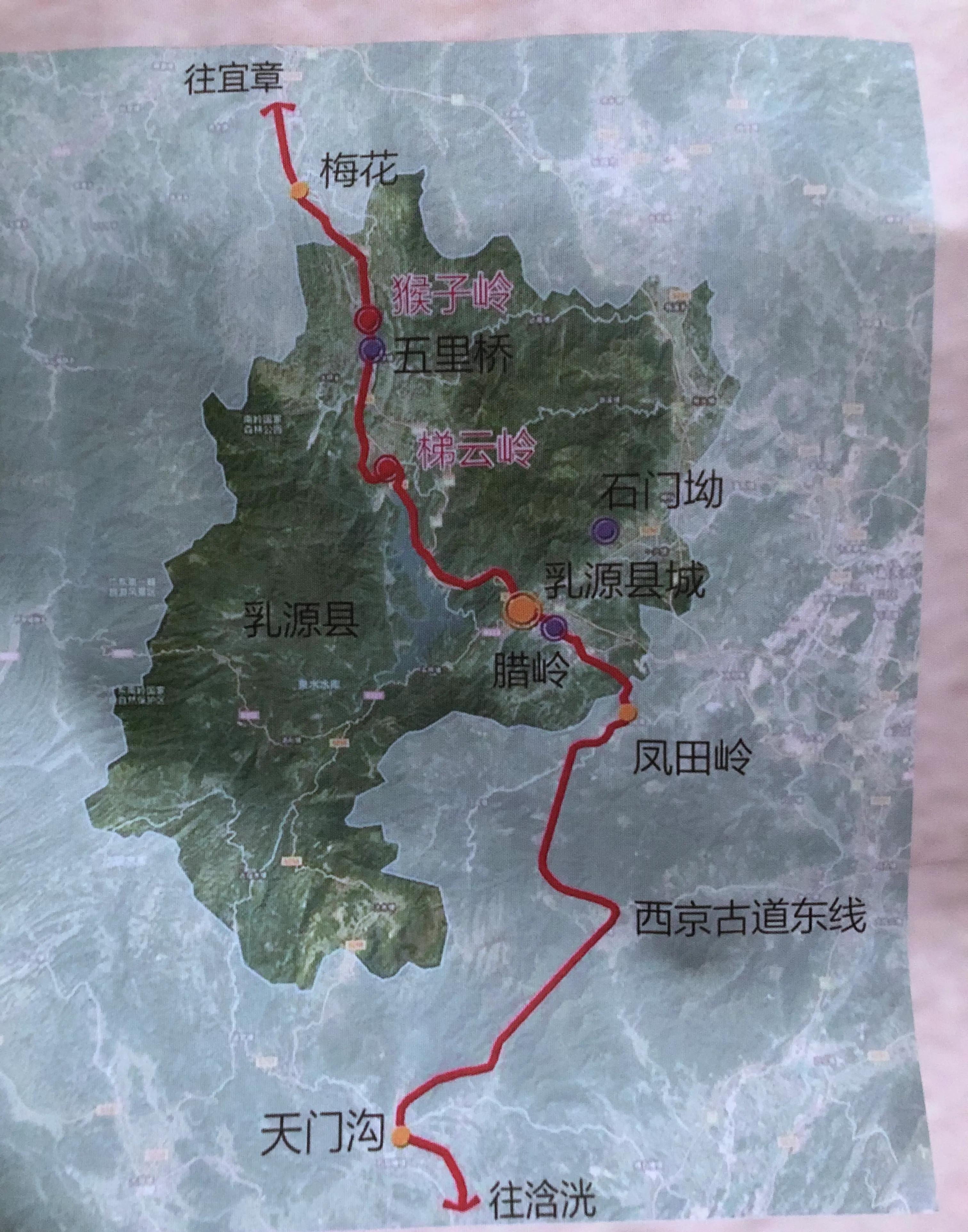Xijing Ancient Road, known as "Xijing Road" in ancient times, is located in Ruyuan Yao Autonomous County, Shaoguan City, and is the road to the capital in ancient times. The Ruyuan Xijing Ancient Road leaves the south gate of the county town, passes through the Laling Mountains on the Dafu Bridge, turns north after reaching Xiaomei Pass, crosses the lofty mountains in the northwest of the county, to Yizhang in Hunan, and goes north to Chang'an, the western capital.
Xijing Ancient Road was built in the second year of the Eastern Han Dynasty (26 years), the total mileage in Ruyuan County is about 70 kilometers, and the well-preserved stone pavement is about 12.5 kilometers, which is the earliest and more complete preserved ancient yidao in Ruyuan Yao Autonomous County, and is also an important part of the Nanyue Ancient Yidao. Earlier, the Central Plains culture was transmitted to Lingnan, promoting local ethnic integration and social and economic development.

Schematic diagram of the Xijing Ancient Road
Introduction of important cultural relics of the Xijing Ancient Road
On October 20, 2012, the Ruyuan Xijing Ancient Road was listed as a cultural relics protection unit in Guangdong Province, and in October 2019, the Ruyuan Xijing Ancient Road was listed in the eighth batch of national key cultural relics protection units.
Recently, I drove from the gate of Nanling National Forest Park to the north along the G240 National Highway, and the destination was Pingshi Town, Lechang City. Halfway through, I came across a sign on the Xijing Ancient Road, so I turned around and walked around.
Introduction to Shenyuan Village
Shenyuan Village, located in the north of Daqiao Town, Ruyuan County, Shaoguan City, Guangdong Province, was included in the fifth batch of traditional Chinese villages on June 6, 2019.
The village is not big, bluestone slab roads, gray brick houses
After this door, it is the back mountain
The door number reads Shenyuan Village in Hongyun Town
In fact, in May 2005, Hongyun Town has been merged into Daqiao Town.
Old house
In the past, I was still very careful about making houses
Yu Jing
Born in 1000 AD and died in 1064, Yu Jing was a famous politician, diplomat, thinker and writer of the Northern Song Dynasty, who worked in politics for 41 years, and was given the Shangshu of the Ministry of Works after his death.
He devoted his life to the wisdom and loyalty of the country, when he built the strategy Kuang, he was a fumin ruler, three envoys Khitan and two Ping Barbarians, he was another historical and cultural celebrity in the Lingnan region after Zhang Jiuling in the Tang Dynasty, and was called "the nine ages of different generations" by posterity.
Yu Jing's descendants used "style" as the family hall name to enshrine Yu Jing's portrait and spread the character and deeds of Yu Xianggong.
Shenyuan Village is an ancient village inhabited by Yu Jing's descendants.
Further back to the village, we will reach the Shenyuan Ancient Road, and when I step on this stone road with both feet, the scene of the ancient people walking through this ancient road hundreds of years ago continues to appear in front of my eyes.
Ancient cobblestone roads
I stood on the cobblestone road and thought, hundreds of years ago, what kind of people were carrying luggage to the north?
officials?
businessman?
refugee?
Or a geographer like Xu Xiake?
Are there any people like me who just come to play?
Billboard
Broken stele
Newly built road monument
Under the bridge is a small river, one end is a walled building, and the other is a road up the mountain
Introduction to the enclosure
The enclosure has been changed to a red watchtower
Deep Source Red Ancient Road Rural Culture Exhibition
The staff is nervously setting up the exhibition, using the watchtower as a red education base
View the whole view of the red watchtower from a distance
arch bridge
The Saigyo Trail is long and there are many monuments to explore.
I hope that next time I have the opportunity to walk again, along the path of the ancients, to reminisce.
There are also a few photos of the Xijing Ancient Road, attached to the back, to share with everyone.
Those who are interested in the historical sites and food are welcome to pay attention to the exchange.
This is a poster I took, and I haven't been to the actual location yet
Tea kiosk on the side of the road
The lintel on the west side, the funeral
The inner frame is timber framed with vents on both sides
East gate lintel, self-denial
Xijing Ancient Road, Laling section
The stone road of Laling, the stones are so slippery, it is not easy for the ancients to walk
The Laling Trail at the bottom of the mountain is submerged in the South Water Reservoir
Revitalize ancient villages and carry forward ancient culture.
Walk the ancient trails in search of good food.